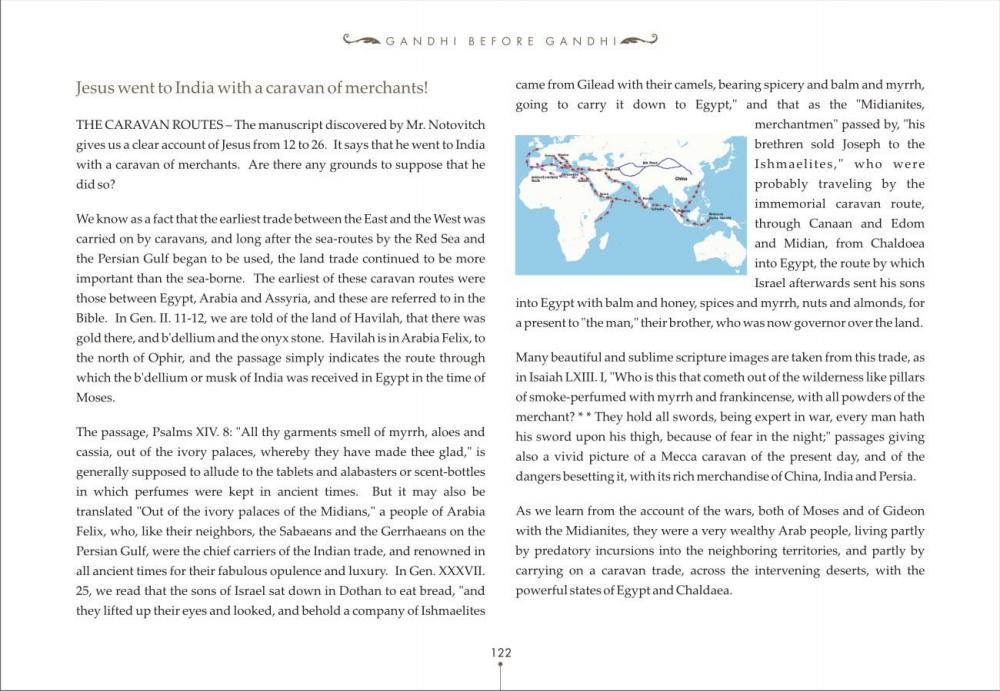________________
GANDHI BEFORE GANDHI
Jesus went to India with a caravan of merchants!
THE CARAVAN ROUTES - The manuscript discovered by Mr. Notovitch gives us a clear account of Jesus from 12 to 26. It says that he went to India with a caravan of merchants. Are there any grounds to suppose that he did so?
came from Gilead with their camels, bearing spicery and balm and myrrh, going to carry it down to Egypt," and that as the "Midianites,
merchantmen" passed by, "his brethren sold Joseph to the Ishmaelites," who were probably traveling by the immemorial caravan route, through Canaan and Edom and Midian, from Chaldoea into Egypt, the route by which
Israel afterwards sent his sons into Egypt with balm and honey, spices and myrrh, nuts and almonds, for a present to the man," their brother, who was now governor over the land.
We know as a fact that the earliest trade between the East and the West was carried on by caravans, and long after the sea-routes by the Red Sea and the Persian Gulf began to be used, the land trade continued to be more important than the sea-borne. The earliest of these caravan routes were those between Egypt, Arabia and Assyria, and these are referred to in the Bible. In Gen. II. 11-12, we are told of the land of Havilah, that there was gold there, and b'dellium and the onyx stone. Havilah is in Arabia Felix, to the north of Ophir, and the passage simply indicates the route through which the b'dellium or musk of India was received in Egypt in the time of Moses.
Many beautiful and sublime scripture images are taken from this trade, as in Isaiah LXIII. 1, "Who is this that cometh out of the wilderness like pillars of smoke-perfumed with myrrh and frankincense, with all powders of the merchant? * * They hold all swords, being expert in war, every man hath his sword upon his thigh, because of fear in the night;" passages giving also a vivid picture of a Mecca caravan of the present day, and of the dangers besetting it, with its rich merchandise of China, India and Persia.
The passage, Psalms XIV. 8: "All thy garments smell of myrrh, aloes and cassia, out of the ivory palaces, whereby they have made thee glad," is generally supposed to allude to the tablets and alabasters or scent-bottles in which perfumes were kept in ancient times. But it may also be translated "Out of the ivory palaces of the Midians," a people of Arabia Felix, who, like their neighbors, the Sabaeans and the Gerrhaeans on the Persian Gulf, were the chief carriers of the Indian trade, and renowned in all ancient times for their fabulous opulence and luxury. In Gen. XXXVII. 25, we read that the sons of Israel sat down in Dothan to eat bread, "and they lifted up their eyes and looked, and behold a company of Ishmaelites
As we learn from the account of the wars, both of Moses and of Gideon with the Midianites, they were a very wealthy Arab people, living partly by predatory incursions into the neighboring territories, and partly by carrying on a caravan trade, across the intervening deserts, with the powerful states of Egypt and Chaldaea.
122




